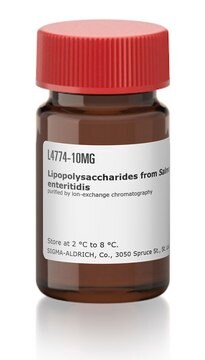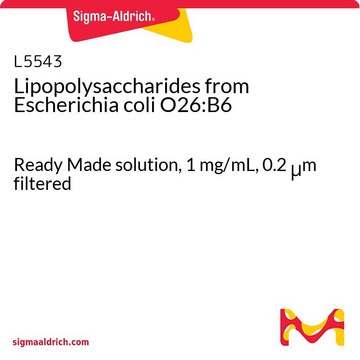L4641
Lipopolysaccharides from Salmonella enterica serotype minnesota
γ-irradiated, BioXtra, suitable for cell culture
Synonim(y):
LPS
Zaloguj sięWyświetlanie cen organizacyjnych i kontraktowych
About This Item
Polecane produkty
pochodzenie biologiczne
Salmonella enterica (Serotype minnesota)
sterylność
γ-irradiated
linia produktu
BioXtra
Formularz
lyophilized powder
oczyszczone przez
gel-filtration chromatography
metody
cell culture | mammalian: suitable
zanieczyszczenia
<1% Protein (Lowry)
temp. przechowywania
2-8°C
Szukasz podobnych produktów? Odwiedź Przewodnik dotyczący porównywania produktów
Opis ogólny
Lipopolysaccharides (LPSs) are characteristic components of the cell wall of Gram-negative bacteria. LPS and its lipid A moiety stimulate cells of the innate immune system by the Toll-like receptor 4 (TLR4), a member of the Toll-like receptor protein family, which recognizes common pathogen-associated molecular-patterns (PAMPs).
Zastosowanie
Lipopolysaccharides from Salmonella enterica serotype Minnesota are used in cell culture and cell binding applications. LPS was used to elicit the activation of NF-κB pathway in human intestinal epithelial cells and mouse dendritic cells. It was used to study the immune responses following autologous blood donation.
Działania biochem./fizjol.
Lipopolysaccharides (LPSs) are characteristic components of the cell wall of Gram-negative bacteria. LPS and its lipid A moiety stimulate cells of the innate immune system by the Toll-like receptor 4 (TLR4), a member of the Toll-like receptor protein family, which recognizes common pathogen-associated molecular-patterns (PAMPs).
Inne uwagi
To gain a comprehensive understanding of our extensive range of Lipopolysaccharides for your research, we encourage you to visit our Carbohydrates Category page.
Ta strona może zawierać tekst przetłumaczony maszynowo.
produkt powiązany
Numer produktu
Opis
Cennik
Kod klasy składowania
13 - Non Combustible Solids
Klasa zagrożenia wodnego (WGK)
WGK 3
Temperatura zapłonu (°F)
Not applicable
Temperatura zapłonu (°C)
Not applicable
Środki ochrony indywidualnej
Eyeshields, Gloves, type N95 (US)
Wybierz jedną z najnowszych wersji:
Masz już ten produkt?
Dokumenty związane z niedawno zakupionymi produktami zostały zamieszczone w Bibliotece dokumentów.
Klienci oglądali również te produkty
R Karger et al.
Transfusion medicine (Oxford, England), 17(1), 45-53 (2007-02-03)
Preoperative autologous blood donation (PABD) has been shown to decrease natural killer (NK) cell function in cancer patients, raising concerns about an increased cancer recurrence risk owing to PABD. It is unclear whether PABD leads to other immunomodulatory effects that
Zsolt Czimmerer et al.
Immunity, 48(1), 75-90 (2018-01-19)
The molecular basis of signal-dependent transcriptional activation has been extensively studied in macrophage polarization, but our understanding remains limited regarding the molecular determinants of repression. Here we show that IL-4-activated STAT6 transcription factor is required for the direct transcriptional repression
Junfeng Zhang et al.
Anesthesiology, 121(4), 773-785 (2014-09-25)
Postoperative cognitive dysfunction is a clinical entity that is associated with poor outcome. We determined the effectiveness of amantadine in reducing surgery-induced cognitive impairment and the role of glial cell line-derived neurotrophic factor (GDNF) in this effect. Four-month old male
Kendra Speirs et al.
Journal of immunology (Baltimore, Md. : 1950), 172(2), 752-756 (2004-01-07)
RelB, a member of the NF-kappaB family of transcription factors, is essential for dendritic cell (DC) maturation. Recent findings indicate that RelB is exclusively regulated through its interaction with cytoplasmic NF-kappaB2/p100. The studies presented in this report show that DCs
Sumit Bhattacharyya et al.
American journal of physiology. Gastrointestinal and liver physiology, 293(2), G429-G437 (2007-06-02)
Lipopolysaccharide (LPS) is recognized as an inducer of the inflammatory response associated with gram-negative sepsis and systemic inflammatory response syndrome. LPS induction proceeds through Toll-like receptor (TLR) in immune cells and intestinal epithelial cells (IEC). This report presents the first
Nasz zespół naukowców ma doświadczenie we wszystkich obszarach badań, w tym w naukach przyrodniczych, materiałoznawstwie, syntezie chemicznej, chromatografii, analityce i wielu innych dziedzinach.
Skontaktuj się z zespołem ds. pomocy technicznej





